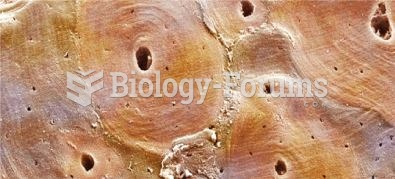|
|
|
The Romans did not use numerals to indicate fractions but instead used words to indicate parts of a whole.
Aspirin may benefit 11 different cancers, including those of the colon, pancreas, lungs, prostate, breasts, and leukemia.
The senior population grows every year. Seniors older than 65 years of age now comprise more than 13% of the total population. However, women outlive men. In the 85-and-over age group, there are only 45 men to every 100 women.
The Centers for Disease Control and Prevention (CDC) was originally known as the Communicable Disease Center, which was formed to fight malaria. It was originally headquartered in Atlanta, Georgia, since the Southern states faced the worst threat from malaria.
There are more sensory neurons in the tongue than in any other part of the body.
 Components of a long bone. The entire long bone is on the left side accompanied by a blowup of the p
Components of a long bone. The entire long bone is on the left side accompanied by a blowup of the p
 Glioma. (a) Illustration of a large glioma (colored area) within the left cerebral hemisphere in a s
Glioma. (a) Illustration of a large glioma (colored area) within the left cerebral hemisphere in a s





